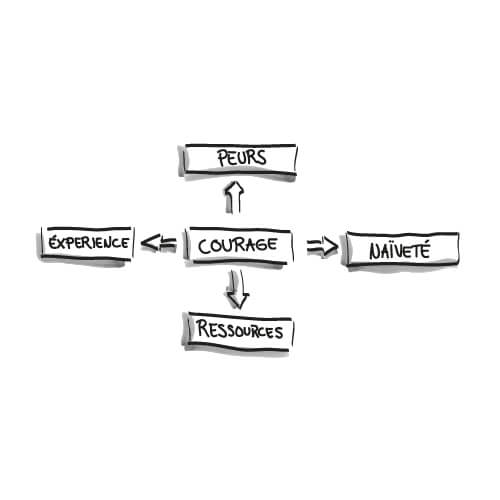The other day, my son caught a spider and let it wander all over him, without showing any fear. Was he being courageous? Have I the right to ask someone to hold a spider, without knowing whether he or she is afraid of them?
The fact is that, for some people, even getting close to a spider is an act of courage!
Courage has to do with our fears. Our fears can be very deep-seated, and we may not even be aware of them. I’m not a psychologist, like many of you. And yet, in my career and in my private life, I have often been faced with fears, my own and other people’s. Especially when change is in the air.
We therefore have to be very careful where courage is concerned. Because we don’t know what the fears of our employees might be.
So how do we go about this?
I suggest we work on four points closely related to courage.
Courage:
Courage is the willingness and the capacity to dare to do something. Courage is founded on self-confidence, experience and strength of character. The capacity to show courage depends on the capacity to assume risk.
Courage represents something different for each individual.
A person who is afraid in situations that are not objectively dangerous behaves courageously to the extent that he or she exposes him/herself to such situations.
The absence of fear in a dangerous situation can also be ascribed to courage, when really it is a sign of experience or naivety.
True courage involves a willingness to suffer the possible physical, psychic and/or social consequences of an action. If a person acts without this willingness, it would be more accurate to call it foolhardiness.
First factor: resources
We have physical, mental/spiritual and material resources. To help another person (my children, my employees) to grow in courage, I may work on their physical resources (a course in self-defence, sport, endurance). I may also work to strengthen their mental resources (these are the resources that often make all the difference, whether in sport or a person’s career). Coaching can be instrumental in this area. Having adequate material resources (a degree of financial security, for example) allows more room for manoeuvre.
Second factor: experience
Accumulated experience is another resource that relates to courage. For experience to be profitable, it needs to be linked with self-reflection. In other words, with the ability to analyse your successes and failures, draw the right conclusions and grow as a result. Courses, job rotation and participation in cross-directional projects are all ways of enhancing your experience.
Third factor: naivety
Some actions may be seen as courageous by others, but in fact the risks have not been taken into account. Due simply to naivety (failure to understand the risks involved), some actions may appear courageous. Though a degree of naivety may be beneficial, risks need to be taken into account, understood and analysed for there to be personal development. There are various techniques and methods for analysing situations or projects in a systematic way.
Final factor: fears
As mentioned earlier, people’s fears are closely related to courage and this is therefore a very personal area.
So we must be cautious.
Listening, dialogue and taking an interest in one’s employees are all very important, especially when change is in the air. This is often when fears rise to the surface. It may sometimes be beneficial to urge a person to overcome their fears, without forcing, but by giving encouragement and above all SUPPORT.
Example:
Let’s take the example of someone who suffers from vertigo. If you are organizing a team outing and you are going to do some climbing indoors or on a climbing wall, a person who suffers from vertigo may well be terrified. Reassure them that they will be safely attached to a rope with an experienced person on the other end. Tell them they will first be doing 1 metre, then 2 metres, and that at any time they can stop or come back down again. As their CONFIDENCE grows, the person will gradually dare to go higher, and may even begin to enjoy the experience. I know a lady who, after climbing 7 metres, was so delighted that she wanted to take up the sport. She remarked that it was not that bad, after all.
The important thing is to be alongside people at times of fear and uncertainty, to listen to them and, above all, give them support and a sense of security.
Don’t leave people alone, without information, support or contact… There is potential for this in many companies, isn’t there?
Boost your employees’ resources, enable them to gain experience, improve their risk-analysis skills while allowing them a degree of naivety and, above all, listen out for their fears.

